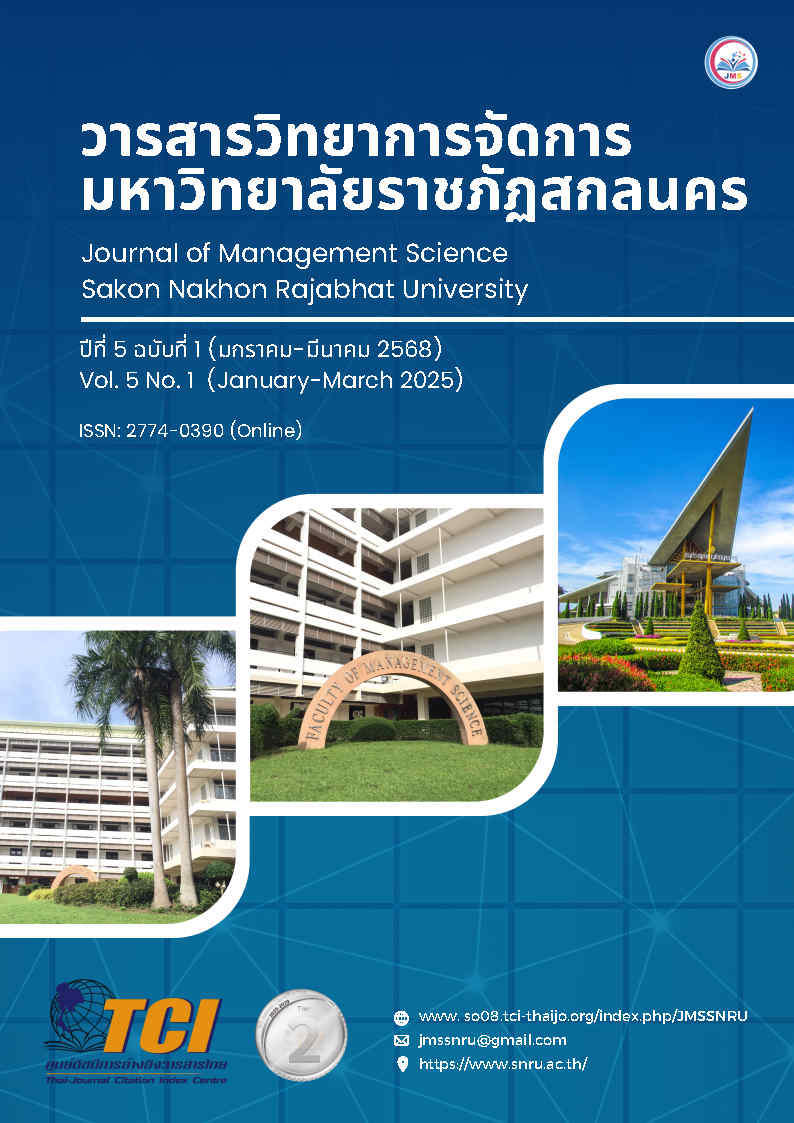Human needs factors affecting behavioral development of the absolute drug prisoners in Nakhon Phanom central prison
Keywords:
behavior, absolute drug prisonerAbstract
Developing the behavior of prisoners who are decisive in drug cases Nakhon Phanom Central Prison will be successful and how effective is it? Many factors, including human behavior, cause it. This research was conducted with the following objectives: 1) To study the level of efficiency in the behavioral development of the absolute drug prisoners in Nakhon Phanom Central Prison. 2) To study the level of human needs factors of the absolute drug prisoners in Nakhon Phanom Central Prison. 3) To look into how human needs factors affect the behavior development of the absolute drug prisoners in Nakhon Phanom Central Prison, and 4) To get guidelines for behavior development of the absolute drug prisoners in Nakhon Phanom Central Prison. Gaining through a stratified sampling method, the sample group consisted of 361 absolute drug prisoners in Nakhon Phanom Central Prison. The researchers employed a questionnaire as a data collection tool and conducted statistical analysis. The researchers utilized frequency, percentage, mean, and standard deviation for data analysis, as well as deviation and multiple regression analysis techniques. The study revealed these results: 1. The absolute drugs prisoners’ human needs factors in Nakhon Phanom Central Prison, as a whole, were at a high level. 2. The overall behavioral development efficiency of the absolute drug prisoners in Nakhon Phanom Central Prison was at a high level. 3. It was found that these human needs significantlyinfluenced on developing the behavior of the absolute drug prisoners in Nakhon Phanom Central Prison at the .01 statistical level: the need for success, the needs for basic physical needs, the need for security and safety, and the need for respect. Furthermore, these needs, with the exception of the need for love, can collectively accurately predict the behavioral development efficiency of absolute drug users. The percentage of prisoners in Nakhon Phanom Central Prison is 54.90 percent and 4. Some guidelines were given for developing the behavior of the absolute drug prisoners at Nakhon Phanom Central Prison. There should be an orientation or preparatory program before releasing each prisoner back into the community. The program should cover self-worth and self-esteem, as well as responsibilities. The researcher will emphatically inculcate self-worth, family, and society in these prisoners. The researchers will prepare the prisoners physically, mentally, and socially before reintegrating them into society based on the absolute drug. The training course should address the conditions, problems, and needs of prisoners. The planning and establishment of the training course should specifically cater to their attendance. Multidisciplinary officers and experts from external agencies should be coordinated with or invited as guests. Speakers are scheduled to lecture, provide knowledge, and assist these prisoners in accordance with their conditions, problems, and needs.
References
กรมราชฑัณฑ์. (2563). รายงานประจำปี 2563 กรมราชทัณฑ์. นนทบุรี: กรมราชทัณฑ์ กระทรวงยุติธรรม.
กองพัฒนาพฤตินิสัย กรมราชทัณฑ์. (2561). คู่มือการจัดโปรแกรมการแก้ไขฟื้นฟูผู้ต้องขังตามลักษณะแห่งคดีและพฤติการณ์การกระทำผิด. นนทบุรี: ส่วนส่งเสริมการศึกษาและพัฒนาจิตใจ กองพัฒนาพฤตินิสัย กรมราชทัณฑ์ กระทรวงยุติธรรม.
ณัฐปราย์ ชัยสินคุณานนต์. (2554). การมีส่วนร่วมของประชาชนในการพัฒนาท้องถิ่นขององค์การบริหารส่วนตำบลสานตม อำเภอภูเรือ จังหวัดเลย. การค้นคว้าอิสระรัฐประศาสนศาสตรมหาบัณฑิต มหาวิทยาลัยราชภัฏมหาสารคาม.
ธนภัทร วางอภัย. (2560). การเตรียมความพร้อมก่อนปล่อยสำหรับผู้ต้องขังที่มีแนวโน้มกระทำผิดซ้ำ ของเรือนจำพิเศษกรุงเทพมหานคร. การค้นคว้าอิสระรัฐประศาสนศาสตรมหาบัณฑิต มหาวิทยาลัยรังสิต.
นฤมนต์ เผ่าเพ็ง. (2558). ปัญหาการปฏิบัติงานด้านการพัฒนาพฤตินิสัยผู้ต้องขังของเจ้าพนักงานเรือนจำ. งานนิพนธ์รัฐประศาสนศาสตรมหาบัณฑิต สาขาวิชาการบริหารทั่วไป มหาวิทยาลัยบูรพา.
นิติพล ภูตะโชติ. (2559). พฤติกรรมองค์การ พิมพ์ครั้งที่ 3. กรุงเทพฯ: สำนักพิมพ์แห่งจุฬาลงกรณ์มหาวิทยาลัย.
เรือนจำกลางนครพนม. (2563). บรรยายสรุปเรือนจำกลางนครพนม ประจำปี 2563. นครพนม: เรือนจำกลางนครพนม.
ศูนย์เทคโนโลยีสารสนเทศ กองยุทธศาสตร์และแผนงาน กรมราชทัณฑ์. (2563). สถิติผู้ต้องขังราชทัณฑ์ทั่วประเทศ รท.102 (ก) สำรวจ ณ วันที่ 1 ธันวาคม 2562. นนทบุรี: ศูนย์เทคโนโลยีสารสนเทศ กองยุทธศาสตร์และแผนงาน กรมราชทัณฑ์.
สถิต แก้วปัญญา, ประจญ กิ่งมิ่งแฮ และไพศาล แน่นอุดร. (2562). แนวทางการพัฒนาพฤตินิสัยของผู้ต้องขังคดียาเสพติดเรือนจำกลางอุดรธานี. วารสารวิชาการมหาวิทยาลัยราชภัฏอุดรธาน, 7(1), 79-93.
สุรณรงค์ แจ่มจรัส. (2559). ความคาดหวัง ความต้องการ ของผู้ต้องขังต่อการดำเนินงานของเรือนจำกลางจังหวัดฉะเชิงเทรา. วารสารการเมือง การบริหาร และกฎหมาย, 8(2), 481-512.
สำนักพัฒนาพฤตินิสัย กรมราชทัณฑ์. (2557). คู่มือการจัดการศึกษาสำหรับผู้ต้องขัง การจัดการศึกษาผู้ต้องขัง. นนทบุรี: ส่วนส่งเสริมการศึกษา สำนักพัฒนาพฤตินิสัย กรมราชทัณฑ์.
สำนักพัฒนาพฤตินิสัย. (2560). คู่มือหลักสูตรการพัฒนาพฤตินิสัย. นนทบุรี: กองพัฒนาพฤตินิสัย สำนักพัฒนาพฤตินิสัย กรมราชทัณฑ์.
อนุชา ร่มพยอม. (2560). ปัจจัยที่มีอิทธิพลต่อการพัฒนาพฤตินิสัยของผู้ต้องขังเรือนจำจังหวัดมหาสารคาม. วิทยานิพนธ์รัฐประศาสนศาสตรมหาบัณฑิต สาขาวิชารัฐประศาสนศาสตร์ มหาวิทยาลัยราชภัฏมหาสารคาม.
อัศม์เดช คงขำ. (2561). การพัฒนาพฤตินิสัยผู้กระทำผิดที่ใช้ความรุนแรงเรือนจำพิเศษมีนบุรี. การศึกษาอิสระรัฐศาสตรมหาบัณฑิต สาขาวิชาสหวิทยาการเพื่อการพัฒนาท้องถิ่น มหาวิทยาลัยรามคำแหง.
Maslow, A. H. (1970). Motivation and Personality. New York: Harper and Row.
Yamane T. (1981). Statistic and Introductory Analysis. (3rd ed.). New York: Harper and Row.
Downloads
Published
How to Cite
Issue
Section
License
Copyright (c) 2025 Journal of Management Science Sakon Nakhon Rajabhat University

This work is licensed under a Creative Commons Attribution-NonCommercial 4.0 International License.
An article published in the Journal of Management Science. Sakon Nakhon Rajabhat University is the opinion, copyright and responsibility of the author of the work.







